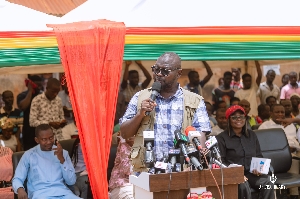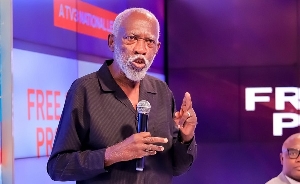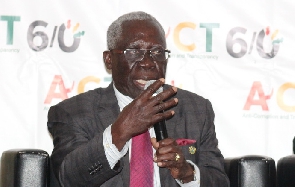By Dr A. Ofori Quaah, Fltwick, UK
“There were two ways to be happy: improve your reality, or lower your expectations”
By Jodi Picolt in Nineteen Minutes
Security
Over the past decade or so, the advent of suicide bombers and other forms of terrorism has meant heightened security around nuclear and other sensitive facilities around the world. We in West Africa have been lucky, in not having been affected by any of that, so far. However, we have had gold bullions hijacked on the highway as they were being transported to Accra, with the connivance of the security outfit that was supposed to be protecting the consignment. The fact that Ghana is now counted among the notorious drug transit centres of the world points to the porous nature of the security arrangements at our only international airport, harbours and land borders.
In 1973, there was a big green, “not to be developed” buffer zone around the Ghana Atomic Energy Commission. No public transport system ran through the Commission. Genuine visitors had to be identified by telephone at the security gate, to be allowed in. Today, because of our non-existent town and country planning procedures, the place is built up right to the Commission’s facilities. The Commission had its own supermarket that served staff and their families. I have not been through the area for about ten years but I will not be surprised if the Commission’s compound is now littered with “tro tro” stations, petty traders’ kiosks and hawkers.
In a country where ‘secure’ police forensic exhibits under lock and key can turn into ‘kokonte’ and sodium bicarbonate, we have either not learnt or else forgotten how to secure sensitive institutions and installations.
I can bet my bottom penny that all the illegal foreign miners that are causing havoc in the countryside have ‘valid visas’ that were secured through corruption by officials of state institutions. The nature of nuclear facilities requires that security systems work honestly and efficiently. We do not have them. Fines for security and safety breaches alone will drive the facility to the wall, unless of course we want everything else to grind to a halt as we grapple with the problems of a nuclear power station. Let us master gas power plant operation, maximise the benefits of hydroelectric dams first. If it takes Israel that is only 9 years older than Ghana and whose total population can easily fit into Kumasi, Accra and Takoradi, to sort us out when just one four-level supermarket collapses, if we need American technicians to fly eight hours to come and point out to us that shoddy Chinese electrical goods and illiterate electrical wiring can cause market fires, we have no business messing with nuclear power stations.
Alternatives There are cheaper, simpler and more manageable alternatives like solar, biomass, tide and wind that can be harnessed to supplement the current hydro and dual cycle gas power generating systems
Solar: Nature has endowed us with sunshine for more than ten months of the year. The Physics Departments at UST and Legon have researched, developed and built solar panels using local materials that match local weather and environmental conditions. I believe that they have been successfully tested and deployed on the campuses of the two universities for several years. If we have billions to support other people’s economies, why don’t we put them in our own economy to create employment, enhance research and improve the local skills base?
If European countries that have just four months of sunshine in a whole year are investing in solar energy, why are we not making use of this abundant and free natural resource? Hyderabad is India’s version of Silicon Valley. All state buildings (ministries, departments, para-statals) and research institutions have solar panels installed on their roofs. Twenty seconds after power goes off, the solar system kicks in automatically. Nearly every kind of software in use today – Microsoft, British Telecom, ITT, you name it, is developed there. So many industries have outsourced their IT to Hyderabad they are planning a second city to help cope with the deluge.
Biomass: Here again India is my favourite example. A United Nations Human Development Report I read last year said there are only two million water closets in Ghana. If for the sake of argument we estimate that there are 6 people to a water closet then, only 12 million people are being properly catered for. It also means that the daily “dos” of over 13 million of our compatriots are being disposed of ‘anyhow’. Then there are the animal droppings. Is it surprising that important rivers like Subin, Akora, Ayensu, Densu and Odaw among many others, are either dead or dying?
One of my Ga friends once told me that some fifty years ago, he used to trap fresh water fish in the Odaw River. Today, I am not sure even frogs survive in that river. Harnessing human and animal waste for power generation could be a vital money-making enterprise for the district assemblies. Trapping and putting into good use this important by-product of nature that is being thrown anywhere and everywhere will help cut the annual cost of treating many environmental diseases. It can actually be developed as a cottage industry and important source of employment, to stem the uncontrollable urbanisation trend in Ghana. The technology already exists in India and I am sure our Commonwealth friends will readily share their technology with us.
A German television programme that I watched some time ago showed that 40% of the energy requirement of the city of Cologne is provided by the controlled burning of the city’s domestic waste. Our towns and cities are being swallowed by garbage. Harnessing this by-product of our lifestyle will not only provide vital energy, but will also help combat diseases like malaria, typhoid fever and cholera and help save rivers, streams and the sea that are current favourite dumping grounds.
Tide: The last time I passed through Sekondi, “the needle and eye” that we used to take special exeat from school to go and gaze at for hours on end were gone, The strong tides have swallowed them both. When my uncle attended a funeral at Keta sometime ago, he discovered that where he used to live back in the mid to late 1950s was about three kilometres out to sea, the tides had taken it away. Strong tides are gnawing away many of our coastal towns and villages. Why can’t we turn them to our national advantage? A good 35% of Scotland’s electricity is generated from sea tides and other renewable forms of energy. On per capita basis, the Scots probably use as much energy as Ghanaians, if not more.
Wind power: When I did microearthquake recordings in the Greater Accra and Eastern Regions in 1978/79, I had to secure the radio masts at the transmission sites with strong ropes, to keep them aligned to the receiver station at Legon. Even then, I had to return to the sub-stations about every other day, to re-calibrate and re-align the antennae. While doing NADMO fieldwork around the country, I encountered strong winds in virtually every part of Western, Central, Greater Accra, Volta, Eastern and Ashanti Regions. I believe this is another natural resource that abounds in every region in Ghana.
Why don’t we use these as the basis of our national re-industralisation and begin to build the foundation for a new industrial take-off? No, we DO NOT need nuclear power at this time of our national development when we cannot even offer and maintain very basic services, unless of course there is something more sinister behind this mad rush than the rest of us ordinary mortals are being told. Poor Ghanaian taxpayer!
Endpiece: Now that we are producing our own oil, if we are really serious about energy, let us cut the strident partisan crap and the daft witch-hunting and invite the top fifty Ghanaian entrepreneurs at home and abroad and challenge them to build a giant refinery/petrochemical complex in the Western Region on Build Operate and Transfer (BOT) basis, to take advantage of the huge but untapped West and Central African finished products market.
Stay blessed.












